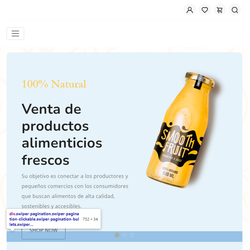
Foodmart
Starting an ecommerce project specialized in food products as a is an excellent business opportunity. Creating a platform that connects local producers with consumers interested in fresh and organic foods can generate a positive economic and social impact. Here we present a step-by-step guide to start a project of these characteristics.
1. Market Study: Understanding Demand and the Niche
Before launching any business, it is essential to understand the environment in which it will operate. Conduct a market study to evaluate:
- Consumer trends: More and more people are looking for healthy, sustainable and fresh foods. Identify if there is a growing demand for organic, fair trade or local products in your area.
- Competition: Research existing platforms. Analyze their strengths and weaknesses to find areas of opportunity that you can capitalize on.
- Target audience: Define your ideal consumers. Are they families? Restaurants? People with specific diets (vegans, celiacs, etc.)? This knowledge will help you personalize your offer and message.
2. Develop a Viable Business Model
The next step is to define how you will generate income. Here are some common options in food ecommerce projects:
- Commission per sale: Every time a producer sells through your platform, you will get a percentage of the transaction.
- Subscription models: Offering monthly or weekly subscriptions for fresh products or food baskets can generate recurring income and customer loyalty.
- Advertising: If the platform grows, you will be able to offer advertising spaces to brands that align with the values of your store.
It is essential that you determine the costs involved (platform development, marketing, logistics) and calculate your profit margins to guarantee the sustainability of the business.
3. Create an Intuitive Ecommerce Platform
Your platform will be the heart of the business, so it must be easy to use for both producers and consumers. Some key features include:
- Product catalog: It must be extensive and easily navigable. Organize products into categories such as fruits, vegetables, meats, organic, gluten-free, etc.
- Recommendation system: Uses algorithms to offer personalized products based on the user's preferences and purchasing history.
- Subscription options: Allow users to receive products on a recurring basis with ease, as well as offering the ability to customize their orders.
- Efficient logistics: Partner with fast and sustainable delivery services, and be sure to offer shipping options that adapt to the needs of the consumer.
4. Strategic Alliances with Local Producers
One of the biggest differentiators of a Foodmart ecommerce is the connection with local producers. By working directly with farmers and producers, you not only ensure the freshness of the products, but you also support the local economy. To forge successful alliances:
- Negotiate fair prices: Work with producers to establish prices that benefit both parties, eliminating the need for intermediaries.
- Offer visibility: Small producers may not have the resources to manage their digital marketing. Give them a space on your platform to tell their story and show the quality of their products.
5. Digital Marketing: The Key to Attract Customers
Launching an ecommerce platform without an effective marketing strategy is like opening a store in the middle of nowhere. To attract and retain customers, you will need a robust digital marketing plan that includes:
- Social networks: Create attractive visual content on platforms like Instagram and TikTok, which are ideal for showcasing fresh and healthy foods. Publish recipes, nutrition tips and share stories from producers.
- SEO: Optimize your website so that consumers can easily find it in search engines like Google. Choose keywords related to the products you offer (organic, fresh foods, local products).
- Email marketing: Offer newsletters with recipes, promotions and new products to keep your customers informed and engaged.
- Collaboration with influencers: Work with health and wellness influencers who can recommend your products to their audience.
6. Development of a Logistics and Distribution System
One of the biggest challenges of a Foodmart is ensuring that products arrive fresh and on time. Here are some recommendations for efficient logistics:
- Same-day delivery: Consider working with express delivery services for fresh produce in urban areas.
- Sustainable packaging: Use biodegradable or recyclable packaging to reduce environmental impact.
- Optimized routes : If you manage your own delivery fleet, use route optimization software to reduce delivery time and operating costs.
7. Scaling the Business: Expansion and New Markets
Once your platform is up and running, it's time to think about expansion. Here are some ideas to scale your project:
- Expand the product offering: Incorporate new products that your customers may need (gourmet products, ecological products for the home, etc.).
- B2B Alliances: In addition to selling to end consumers, you can form alliances with restaurants, hotels and chefs who need fresh products on a large scale.
- Franchises or new markets: If your platform is successful in one region, you could replicate it in other cities or even franchise the model internationally.
Starting a Foodmart ecommerce project like GreenBite Market is an excellent opportunity to capitalize on the growing demand for fresh, local and organic products. However, success will depend on your ability to create an intuitive platform, forge partnerships with producers, and execute a solid digital marketing strategy. With an approach focused on quality, sustainability and technological innovation, you will be able to build a profitable business with a positive impact on the community. The time to start a business in the fresh food sector is here!


